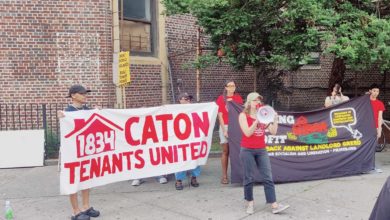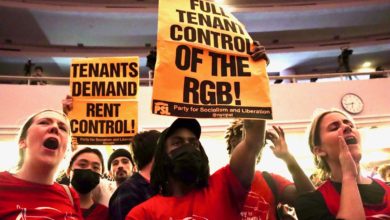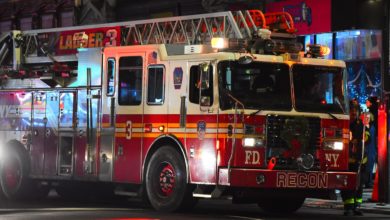For over two years, members of the Connolly Youth Movement have been living in a reclaimed house near downtown Cork, Ireland. This politically motivated squat has been dubbed the “Connolly Barracks,” named for the Irish socialist James Connolly, one of the leaders of the 1916 Easter Rising. Liberation staff had the chance to visit the Barracks and meet with its residents in 2019.
The CYM is a vibrant communist organization that has united youth from across the Irish working class with its bold stances on issues such as housing, health care and Irish unity. In recent months, the group has seen considerable growth and now has active members in every major urban center on the Irish island.
The longstanding occupation of the Connolly Barracks is a victory for the CYM. For its residents, it has turned the struggle for fair housing into a fundamental part of their everyday lives. CYM members have put considerable time, effort and money into restoring and cleaning the building, which had been empty and neglected for several years prior to the occupation. Lack of electricity, heat and warm water remain a daily challenge.
Despite these hardships, residents are able to affordably live in Cork city near places of work and education, often a struggle for youth in a country where urban rents are sky-high. “Living here has meant that commuting, which has often been such a constant source of stress, has been reduced to a 20-minute walk to and from my workplace,” says Kevin, CYM member and resident at the Connolly Barracks. “This allows me an extra hour a day for an activity of my choosing, whether it be exercise, reading a book, or just talking to my housemates.”
Occupation as direct action
Members of the CYM recognize that taking up residence in a vacant building is a pragmatic solution to the cruel paradox of real-estate capitalism: people-less homes and homeless people. The financial shock wave from Wall Street greed in the United States reached Ireland early during the Great Recession, leaving behind foreclosed homes and uncompleted buildings, many of which remain vacant to this day. Meanwhile, a February 2020 government survey counted 10,148 people without homes, more than 3,000 of whom are dependents. Homeless people in Cork have suffered attacks and regularly endure harsh weather, and are particularly vulnerable during the COVID-19 pandemic.
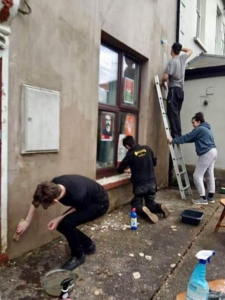
The Barracks is at once a living space, a place of organizing, and a living political project in and of itself. The CYM publication Forward explains that the occupation is part of an effort to build an experienced network of tenants and squatters capable of coordinating rent strikes and mass occupations. These tactics can be used to place pressure on private landlords to lower rents, and on the government to provide more affordable housing. Building solidarity and class-consciousness among the un- and insecurely housed is the essence of the project. To this end, CYM members have also knocked on doors with tenant organizers and joined a sit-in at the office of a rental agency in Belfast. The Cork branch also regularly delivers food and supplies to people sleeping on the streets.
Vittorio Bufacchi, a lecturer in Political Philosophy at University College, Cork, addressed the subject of the occupation in a 2019 interview with Hot Press: “Property taxes in Ireland are very, very low by comparative standards. … So, there is no incentive to do anything with a vacant house.” Buffachi addressed the necessity of direct action: “Any democratic society desperately needs an element of civil disobedience. You need people who are prepared to stand up and make themselves heard and make life difficult for the authorities.”
Housing reclamation in the United States
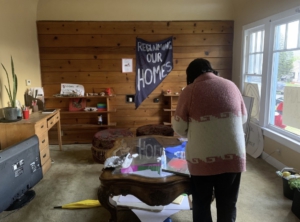
Since the Great Recession, the United States has seen many public reclamations of unused homes. In the early 2010s, activists aligned with the Occupy Our Homes movement showed up all around the country in large numbers to occupy vacant houses and to defend the homes of potential evictees with their bodies. In Minneapolis, Occupy organizers forced Bank of America to offer an affordable mortgage adjustment on a home they were preparing to seize, saving a working man from eviction in the middle of a Midwestern winter.
In recent memory, California saw the homeless families of Moms 4 Housing reclaim an Oakland home from house-flipping corporation Wedgewood LLC. “When we had to sleep in hotels, it was very violent, there were men trying to prey upon me and I’m trying to raise my children,” explained Dominque Walker, one of the Moms, in an interview with KALW last year. “Nobody owns this home, a corporation owns this home. … I deserve to stay here, we’re gonna stay here and we’re not leaving.”
The global pandemic has reminded the world that lack of housing can be, and always has been, lethal. Fighting against an economic system that values profit over people’s lives is a matter of survival, and not just for those who are currently unhoused. As many as 40 percent of US adults are unable to afford an unexpected $400 expense, while 36 percent of US households are considered “liquid asset poor”, according to studies conducted in 2016 and 2017. Many working families are on the brink of experiencing homelessness or housing insecurity, and all the consequences they entail for their health, future and their children’s development.
Until we have a government that prioritizes the well-being and dignity of the people it represents and guarantees adequate housing for everyone, poverty and precarity will be the reality for all of the hard-working people without a bootstrap to pull on. A government like this will not be handed to us in any election, it must be built through revolutionary struggle.
“Living in Connolly Barracks has taught me, above all else, that through direct action taken by and for the community, the working class can make a profound impact on mainstream discourse and challenge the ‘common sense’ ideals which oppress them,” Kevin explained. Barracks residents are putting their lives on the line to challenge the status quo. Their spirit of resistance is an inspiration to organizers around the world.
Keep up with the CYM at cym.ie and through their facebook page. You can also support their efforts to feed people sleeping on the street through their gofundme.


